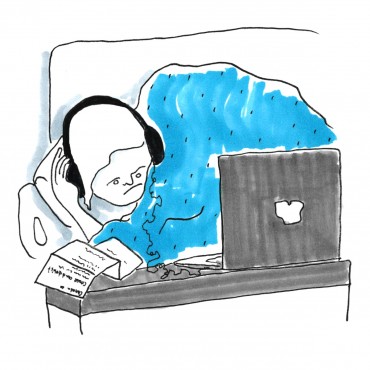
Amy Smith (graphic)
Where would our culture be without the Internet? For most, it’s an essential service, so why not treat it as such? With our data being passed around without transparency, why must we be abused by Internet providers as they bounce us between “one-time offers”? Many students here at UVic have bounced between Telus and Shaw, treading water month to month until the price is hiked up and the competitor shows up at your door with a new “better” offer. Would we get this kind of treatment from an electrical provider? Power flickering on and off for days and being forced to switch to another electric company because the prices doubled? Or, what about the post office opening all your mail, recording the info and selling it to as many people as they can?
Not only are prices going up, but customer privacy is being further eroded with the final step of the Copyright Modernization Act coming into force. The Notice and Notice regime is a voluntary process being enforced as of Jan. 2nd, which compels Internet service providers (ISPs) to tell copyright holders that certain IP addresses are associated with potential copyright infringement. They will also send letters to Canadians suspected of illegally downloading copyrighted content. These ISPs will retain records of these notices for up to a year, in case the owner of the copyrighted material pursues legal action. However, ISPs are not compelled to reveal the names of the potential infringers right away, just their IP addresses. However, that doesn’t stop a court from requiring them to release the names in the event of a lawsuit. American corporations like Rightscorp are already sending threatening letters to Canadians asking them to settle for the “low price” of $20 per infringement instead of the $150 000 maximum allowed by American law, but what they don’t tell Canadians is that those laws don’t have power across the border.
Virtual Private Networks (VPN) and privacy software will become more mainstream over the next decade to keep browsing habits and application use private, but that’s not an ideal solution. Copyright holders have a right to ensure their content is being paid for; it’s easy to fault a huge entertainment corporation, but indie artists still need to make a living somehow. Illegal downloading was a stopgap measure until a workable content distribution model surfaced online. With quick public adoption of streaming services like Netflix, Spotify, Rdio, and Songza, that model seems to be holding. They’re not perfect for everyone (artists like Thom Yorke and Taylor Swift claim the Spotify royalties are too low), but it’s better than the alternative. And this doesn’t excuse greater breaches of personal privacy that are necessary to achieve copyright compliance.
These higher rates, slower speeds, and privacy concerns do not bode well for what is an essential service. Commerce, communication, government work, even national security depends on the Internet, and it should be protected as much as our water or food supply, because those depend on the Internet, too, however indirectly. Industry has a habit of moving faster than government, but without a watchful eye, the law may not adapt in time.







